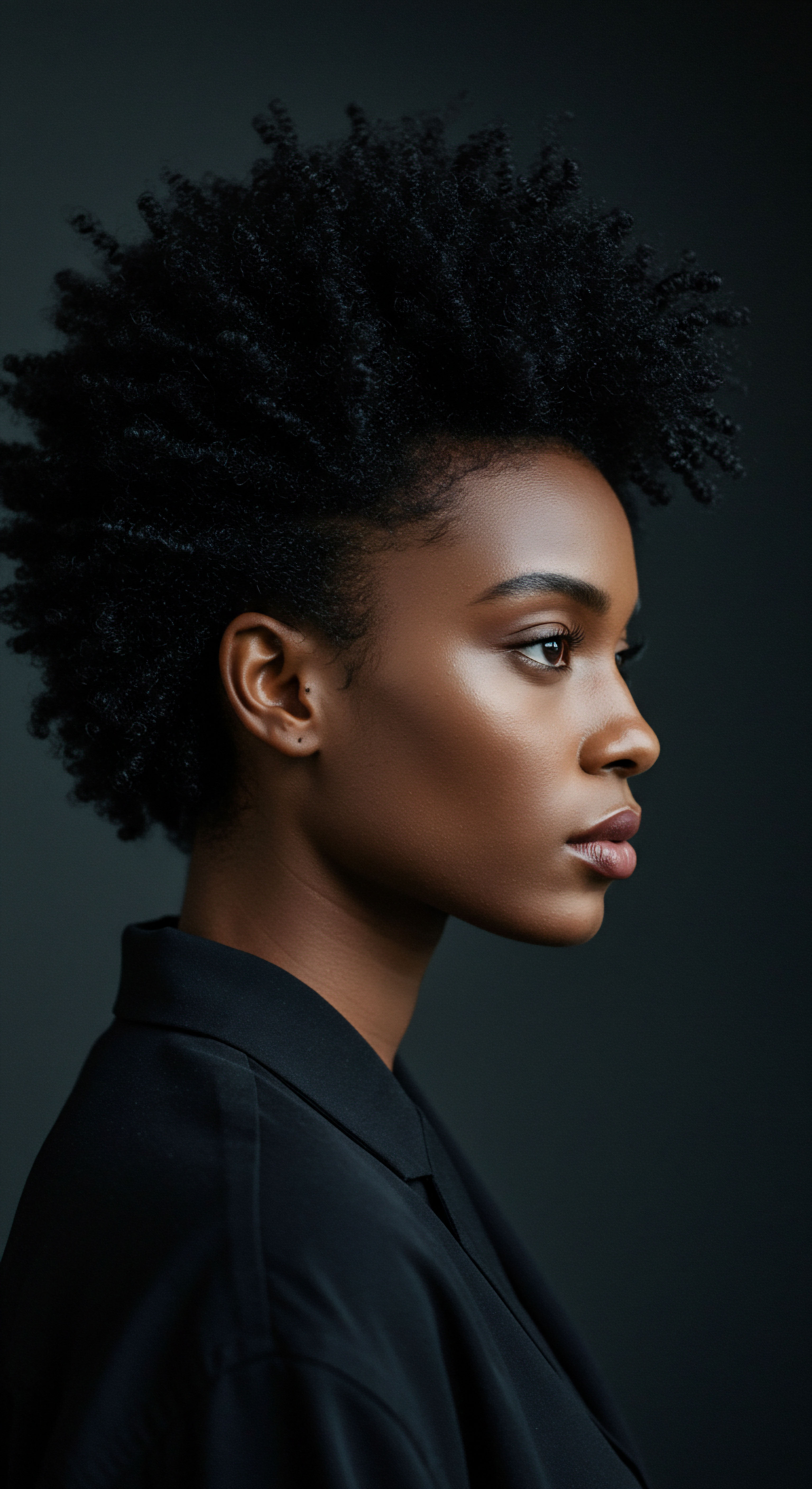
Roots
The quiet moments of rest, often dismissed as mere cessation of activity, hold a profound secret for the vitality of our hair. We speak of beauty rituals and nourishing potions, yet seldom do we turn our gaze inward, to the silent rhythm that governs so much of our physical being ❉ sleep. The connection between our nightly repose and the flourishing of our strands is not a casual one; it is a fundamental interplay, rooted deeply in our biology and reflecting the wisdom our bodies carry. Understanding this connection requires a thoughtful look at the very beginnings of hair, its intricate life cycle, and how that cycle responds to the gentle sway of our internal clocks, or the jarring disruption of sleepless nights.
Our hair, whether tightly coiled, loosely waved, or straight, begins its existence within the skin, in tiny organs called hair follicles. These follicles are dynamic structures, each operating on its own biological timetable, a cyclical process of growth, transition, and rest. This cycle is far from arbitrary; it is a carefully orchestrated sequence, responsive to the body’s internal signals. When these signals falter, the rhythm of growth can become uneven, potentially altering the very nature of our hair’s presence on our heads.
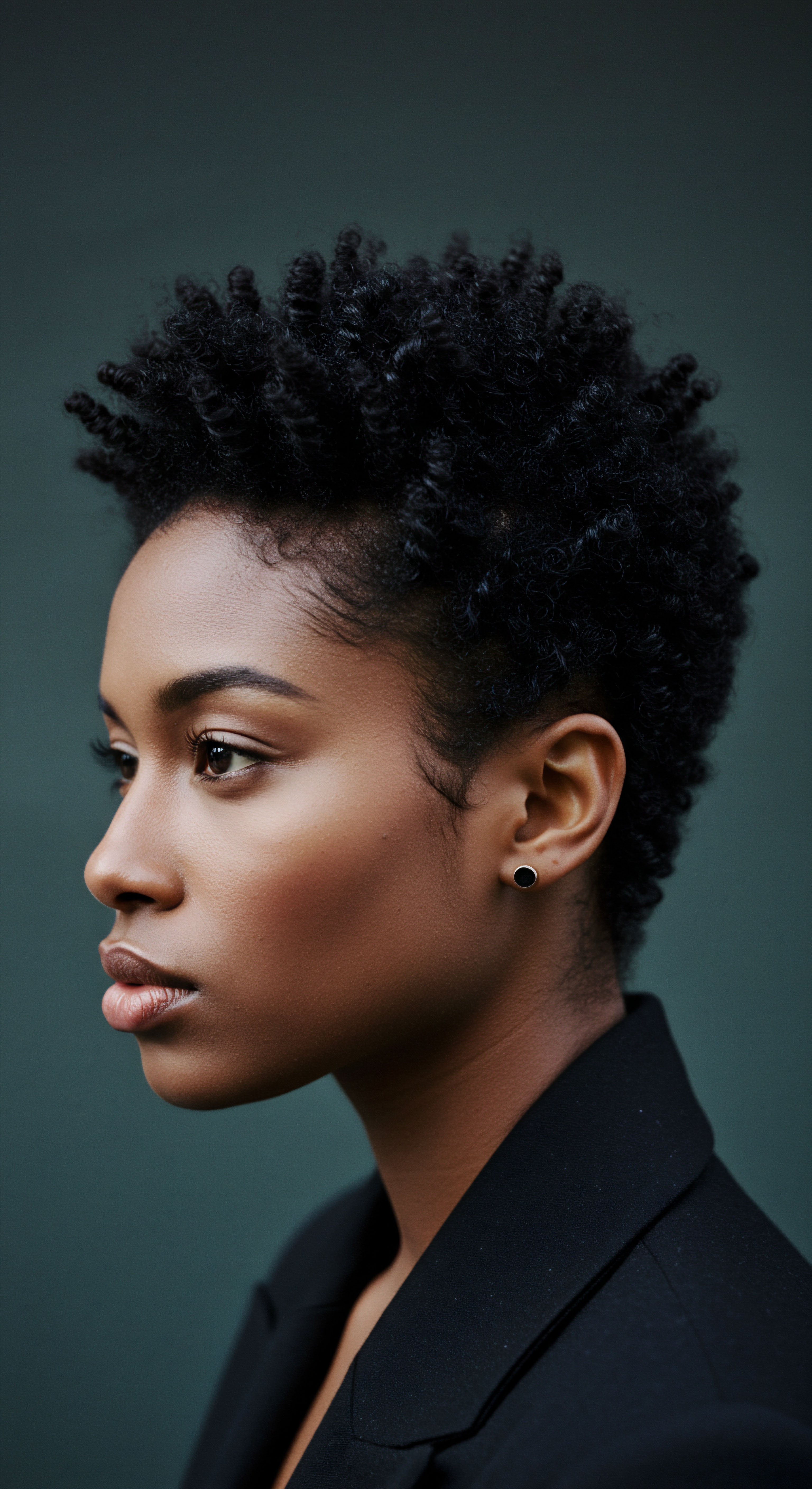
Hair Anatomy and Its Life Cycle
Every strand of hair on our heads undergoes a continuous, yet cyclical, process of renewal. This process is divided into distinct phases, each crucial for maintaining the health and density of our hair. A single hair follicle will repeat this cycle many times throughout a person’s life, each phase serving a specific biological purpose.
- Anagen ❉ This is the active growth phase, where hair cells rapidly divide and grow, pushing the hair shaft outwards from the follicle. This phase can span several years, determining the maximum length a hair can achieve. For textured hair, this period often extends longer, allowing for the formation of its characteristic coils and patterns.
- Catagen ❉ A brief transitional phase follows anagen, lasting only a few weeks. During this time, hair growth slows, and the follicle begins to shrink, preparing for the resting stage. The hair detaches from its blood supply, signifying the end of its active growth.
- Telogen ❉ This is the resting phase, typically lasting a few months. Hair remains in the follicle but is no longer actively growing. At the close of this phase, the old hair sheds, making way for new growth from the same follicle.
- Exogen ❉ While often considered part of the telogen phase, exogen is the active shedding phase, where the old hair physically detaches from the scalp. This natural shedding is a sign of a healthy cycle, clearing the path for the emerging new hair.
The synchronization of these phases across the thousands of follicles on our scalp is vital for maintaining consistent hair density. When this delicate balance is upset, particularly when too many follicles shift prematurely into the resting or shedding phases, noticeable changes in hair volume can occur.
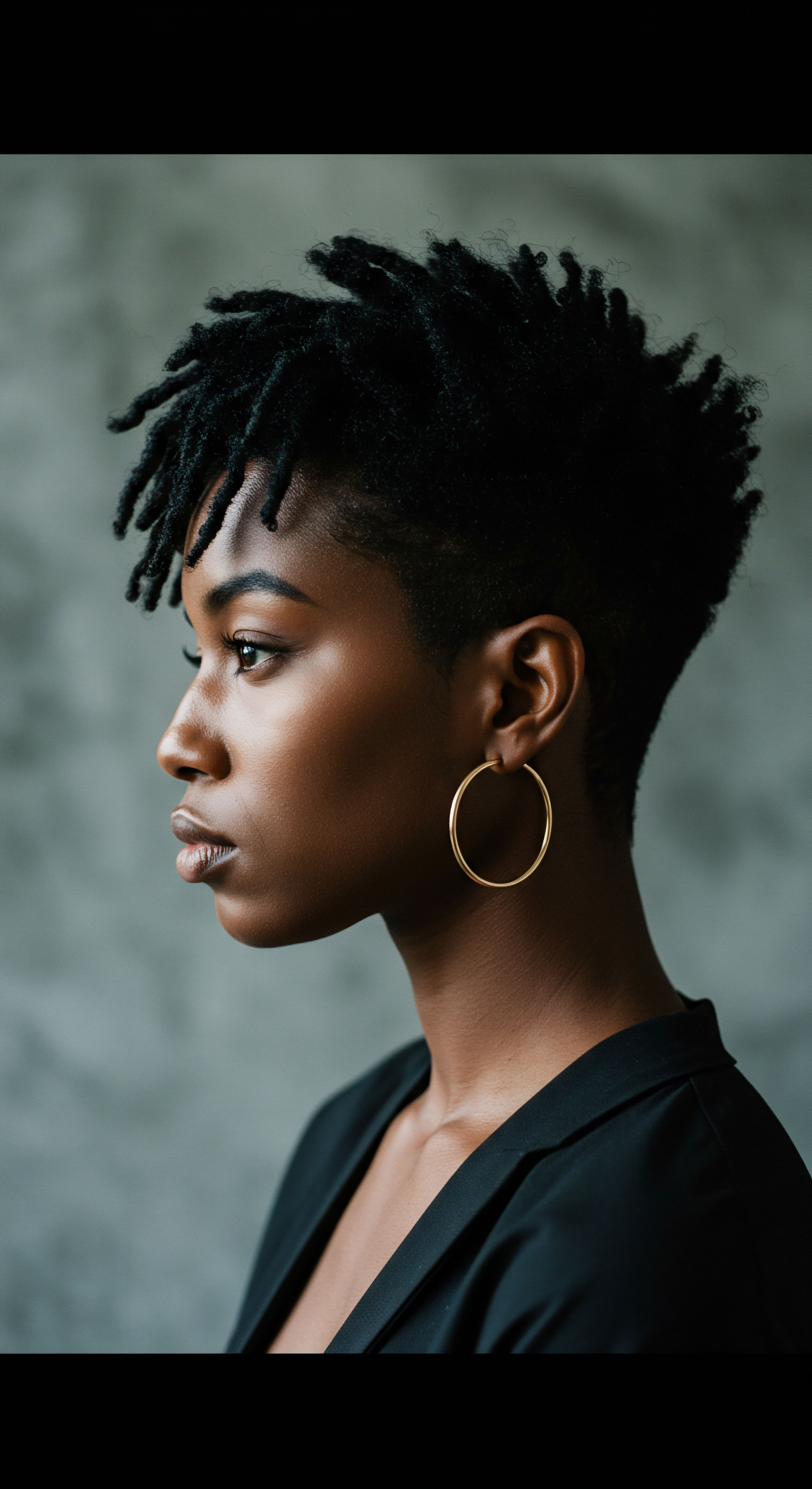
How Internal Clocks Shape Hair Growth
The body’s internal clock, known as the circadian rhythm, orchestrates countless physiological processes, from hormone release to cell regeneration. Hair follicles, like other cells, are deeply influenced by this daily rhythm. During periods of deep rest, particularly the non-REM stages of sleep, the body dedicates resources to repair and regeneration.
This includes the cells within hair follicles. Growth hormones and other vital compounds are released, supporting the active growth phase of hair.
A consistent sleep schedule helps to keep these biological rhythms in tune, allowing the hair follicles to progress through their cycles as intended. Conversely, irregular sleep patterns or insufficient rest can send confusing signals to the body, potentially interfering with the natural timing of hair growth and renewal. This interference can manifest in ways that are not immediately apparent but accumulate over time, impacting the overall health and vitality of our hair.
The silent hours of rest are a foundational element for hair’s well-being, guiding its growth cycles and cellular repair.
Consider the broader implications ❉ if the body is constantly in a state of alert due to insufficient sleep, its priorities shift. Resources that would normally be allocated to non-essential functions, such as robust hair growth, are redirected to more immediate survival needs. This fundamental redirection begins at the cellular level, influencing the very environment in which hair follicles operate.
The interplay between our sleep and our hair’s inherent biology is a testament to the interconnectedness of our bodily systems. Just as a plant needs consistent sunlight and water to flourish, our hair requires the consistent, restorative power of proper rest to maintain its strength and beauty. Recognizing this foundational link is the first step toward a more holistic approach to hair care, one that acknowledges the silent work our bodies do each night.

Ritual
Moving from the fundamental understanding of hair’s biological rhythms, we now turn our attention to the practical implications of sleep’s absence. It is one thing to acknowledge that rest plays a part, quite another to grasp how the daily rhythms of our lives, particularly those that steal from our sleep, directly affect the visible life of our hair. Many of us navigate demanding schedules, sacrificing precious hours of repose without fully comprehending the quiet toll it takes on our strands. This section explores the tangible ways in which disrupted sleep manifests in our hair, offering a more practical understanding of this often-overlooked connection.
The notion of “beauty sleep” is more than a pleasant saying; it points to a scientific truth. When sleep is consistently cut short or fragmented, the body enters a state of physiological imbalance. This imbalance does not spare the hair follicles, which are remarkably sensitive to systemic changes. The practical wisdom here lies in recognizing the symptoms and understanding the mechanisms at play, allowing us to align our daily practices with the needs of our hair.

How Sleep Deprivation Alters Hair Cycles
The hair growth cycle, a finely tuned process, becomes susceptible to disruption when sleep patterns are irregular. The body’s natural restorative processes, which are heightened during sleep, are curtailed. This directly impacts the hair follicle’s ability to maintain its active growth phase.
A significant consequence of sleep deprivation is the alteration of hormone levels. Cortisol, often termed the “stress hormone,” sees elevated levels when sleep is inadequate. This heightened cortisol can signal hair follicles to prematurely transition from their active growth phase (anagen) into the resting phase (telogen), leading to increased shedding. This condition, known as Telogen Effluvium, results in widespread hair thinning rather than distinct bald patches.
Insufficient rest can prematurely push hair follicles into a resting state, increasing shedding and diminishing overall hair density.
Beyond cortisol, other hormones essential for hair health, such as melatonin and growth hormone, are also affected. Melatonin, primarily known for regulating sleep, also plays a part in hair growth, with receptors found in hair follicles. Reduced melatonin due to poor sleep can hinder the signals that promote healthy hair growth.
Growth hormone, released during deep sleep, is vital for cellular repair and regeneration, including that of hair follicle cells. A lack of this hormone impedes the body’s ability to mend and fortify its hair structures.
| Hair Cycle Phase Anagen (Growth) |
| Normal Function Active cell division, hair lengthening. |
| Effect of Disrupted Sleep Shortened duration, reduced growth. |
| Hair Cycle Phase Catagen (Transition) |
| Normal Function Follicle shrinks, growth ceases. |
| Effect of Disrupted Sleep Premature entry, signaling early end of growth. |
| Hair Cycle Phase Telogen (Resting) |
| Normal Function Hair rests before shedding. |
| Effect of Disrupted Sleep Extended duration, leading to increased shedding. |
| Hair Cycle Phase Exogen (Shedding) |
| Normal Function Old hair detaches, new growth begins. |
| Effect of Disrupted Sleep Accelerated shedding, potential for delayed new growth. |
| Hair Cycle Phase Disruptions to sleep can alter the delicate balance of these phases, favoring resting and shedding over active growth. |

Blood Flow and Nutrient Delivery
The scalp, a highly vascular area, requires a steady supply of oxygen and nutrients to support healthy hair growth. During restful sleep, blood circulation to the scalp improves, delivering these vital components to the hair follicles. When sleep is disrupted, this optimal blood flow can be compromised, depriving follicles of the nourishment they need to function optimally.
Think of it as a garden. Even with the best soil, if the water supply is inconsistent, the plants will struggle. Similarly, hair follicles, even with a genetic predisposition for robust growth, will struggle without consistent nutrient delivery. This reduced circulation can weaken hair strands, making them more prone to breakage and thinning.
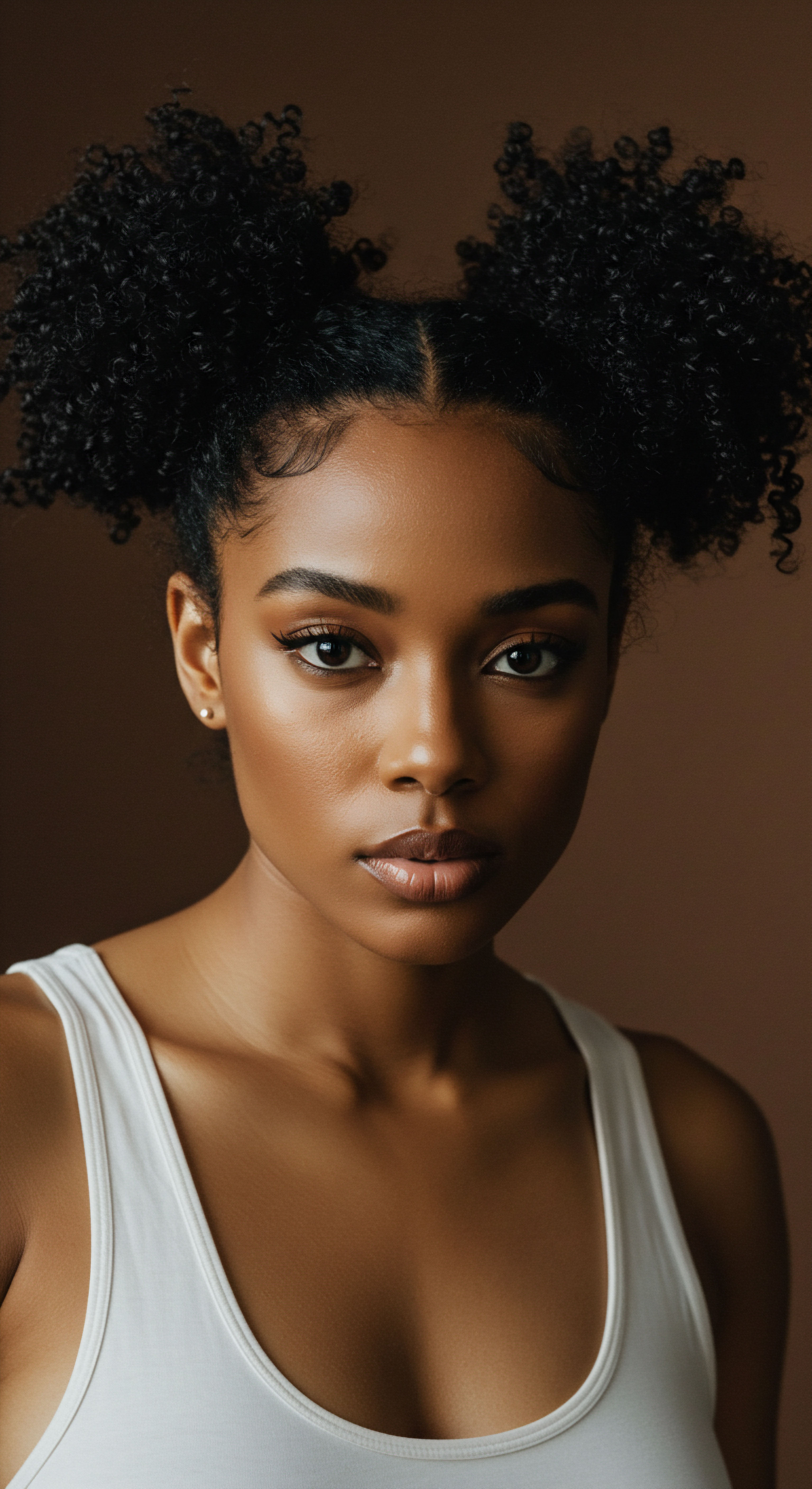
Inflammation and Scalp Environment
Chronic sleep deprivation can also contribute to systemic inflammation within the body, including the scalp. Inflammation can damage hair follicles and disrupt their normal growth cycles. A compromised scalp environment, perhaps due to increased oxidative stress from lack of sleep, can also contribute to conditions such as seborrheic dermatitis or general irritation, further impeding hair health.
One study conducted in 2019 by Elma D. Baron and colleagues revealed that night shift workers, who often experience disrupted sleep, were more prone to skin conditions like acne, irritations, and seborrheic dermatitis. This suggests a direct link between irregular sleep and a less healthy scalp environment, which in turn can affect hair quality. This observation provides a tangible connection between sleep patterns and the visible state of our hair and scalp.
The practical application of this understanding is clear ❉ tending to our sleep is a direct way to tend to our hair. It is a quiet act of care that allows the body to perform its necessary nightly functions, supporting the very foundations of healthy, vibrant strands. By prioritizing consistent, quality rest, we offer our hair the best possible conditions for its continued vitality.
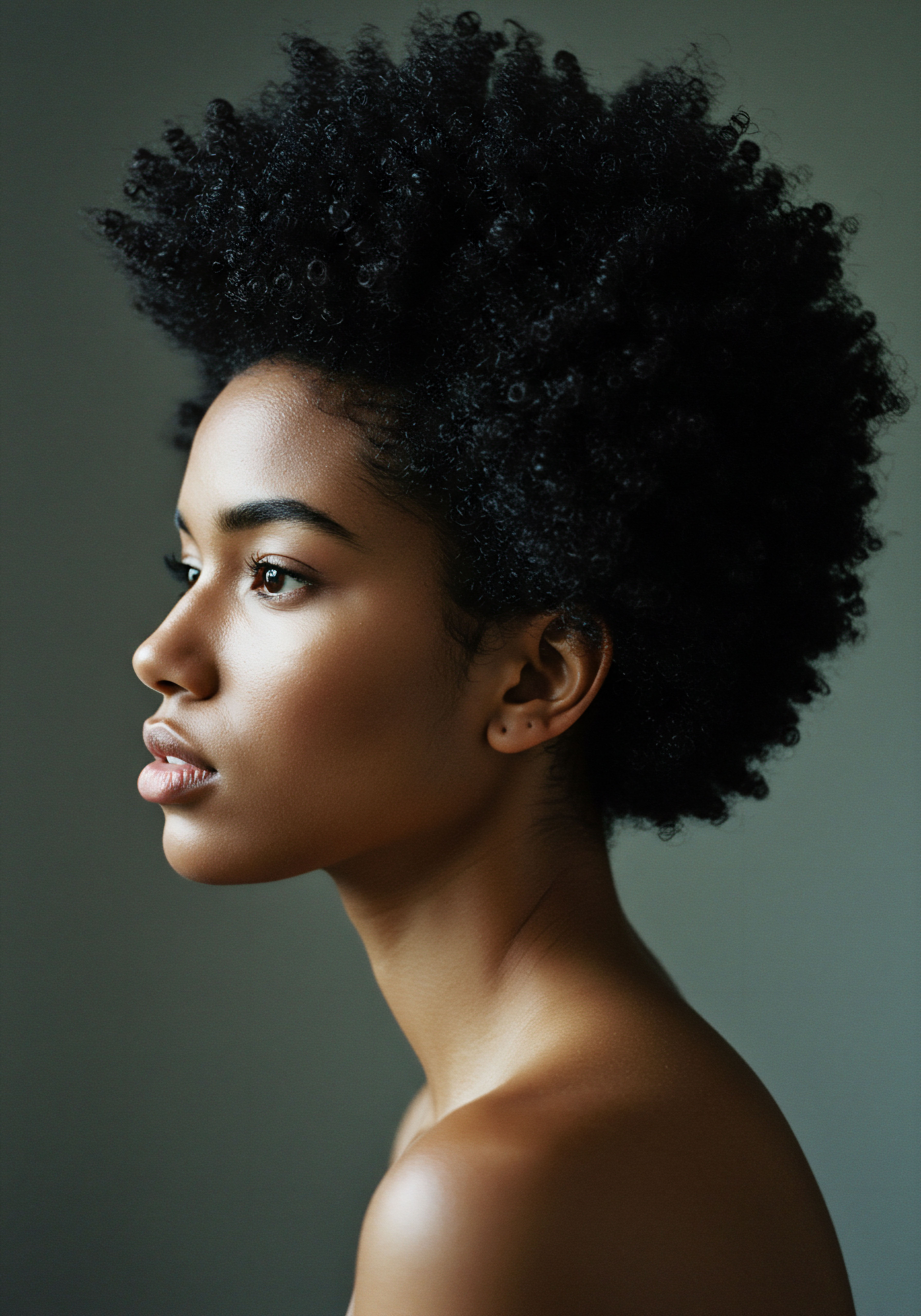
Relay
Beyond the immediate biological shifts, what deeper, more interconnected currents flow between our slumber and the vitality of our hair? The conversation extends beyond simple cause and effect, inviting us to consider the intricate dance of biological systems, psychological states, and even cultural echoes that resonate through our hair’s journey. This section ventures into the more complex, scientific, and culturally informed dimensions of how disrupted sleep affects hair growth, revealing a web of influences that shape our crowning glory.
The very act of rest, in its profound silence, permits a symphony of internal processes to unfold. When this symphony is interrupted, the disharmony can reverberate through our entire being, including the delicate machinery of hair production. We find ourselves at a crossroads where cutting-edge research meets ancient understanding, where the molecular level of our follicles speaks to the broader patterns of our lives.
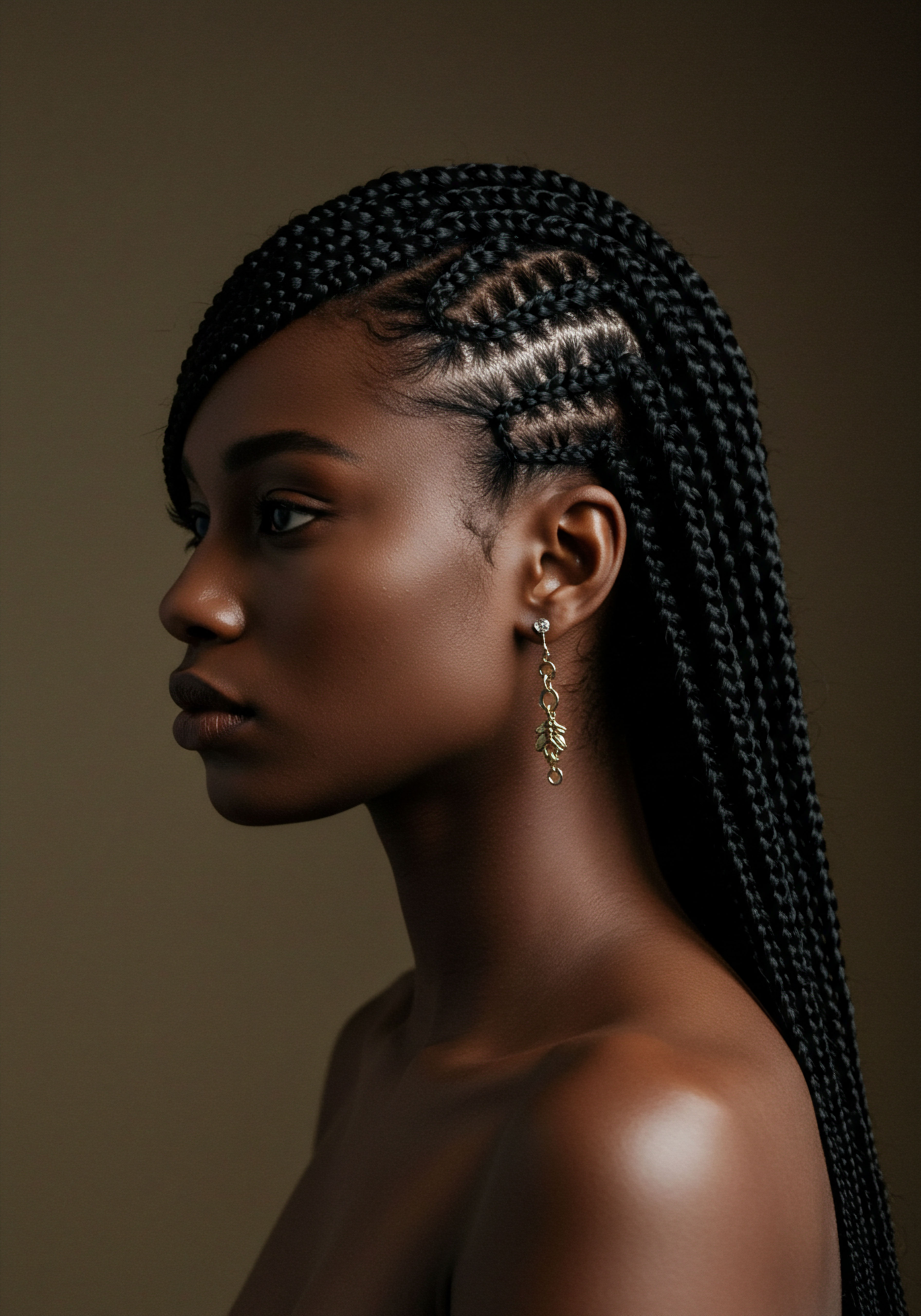
Neuroendocrine Responses to Sleep Disruption
The human body’s response to insufficient sleep is not merely one of fatigue; it triggers a cascade of neuroendocrine adjustments. The hypothalamic-pituitary-adrenal (HPA) axis, the body’s central stress response system, becomes hyperactive. This leads to sustained elevations of cortisol, a hormone with widespread effects on bodily functions, including hair follicle cycling.
Elevated cortisol levels have been shown to directly impact hair follicle activity, promoting a premature shift from the active anagen phase to the resting telogen phase. This hormonal signaling can effectively put hair growth on pause, diverting resources away from proliferation and towards a state of cellular conservation. A 2022 study found a strong link between severe Alopecia Areata, a patchy hair loss condition, and sleep issues, including less than six hours of sleep, high stress scores, and obstructive sleep apnea. This highlights a significant correlation, suggesting that prolonged physiological stress from poor sleep can worsen autoimmune responses affecting hair.
Moreover, the sleep-regulating hormone melatonin, produced primarily at night, also plays a role in hair growth. Melatonin receptors have been identified in human hair follicles, suggesting its direct influence on the hair cycle. Chronic sleep disruption can lower melatonin levels, thereby potentially hindering its beneficial effects on prolonging the anagen phase and promoting hair follicle health.

The Oxidative Stress Burden
Beyond hormonal shifts, sleep deprivation can induce a state of oxidative stress within the body. This occurs when there is an imbalance between the production of reactive oxygen species (free radicals) and the body’s ability to neutralize them with antioxidants. These reactive species can damage cellular structures, including those within the hair follicles and scalp.
Damage to hair follicle cells can impair their ability to function optimally, leading to weakened strands, reduced growth, and even premature graying. The scalp environment, crucial for healthy hair, also suffers under oxidative stress, potentially leading to inflammation and discomfort. This intricate biological mechanism underscores why consistent, restorative sleep is not merely about feeling rested, but about providing the cellular protection necessary for vibrant hair.
| Mechanism Elevated Cortisol |
| Direct Hair Impact Premature telogen shift, increased shedding. |
| Supporting Research |
| Mechanism Reduced Melatonin |
| Direct Hair Impact Shortened anagen phase, impaired growth signals. |
| Supporting Research |
| Mechanism Oxidative Stress |
| Direct Hair Impact Cellular damage in follicles, weakened hair, potential premature graying. |
| Supporting Research |
| Mechanism Compromised Blood Flow |
| Direct Hair Impact Reduced nutrient/oxygen delivery to follicles. |
| Supporting Research |
| Mechanism Immune System Dysregulation |
| Direct Hair Impact Potential for autoimmune responses affecting follicles (e.g. alopecia areata). |
| Supporting Research |
| Mechanism The body's internal systems respond to sleep disruption in ways that can significantly impede hair health and growth. |
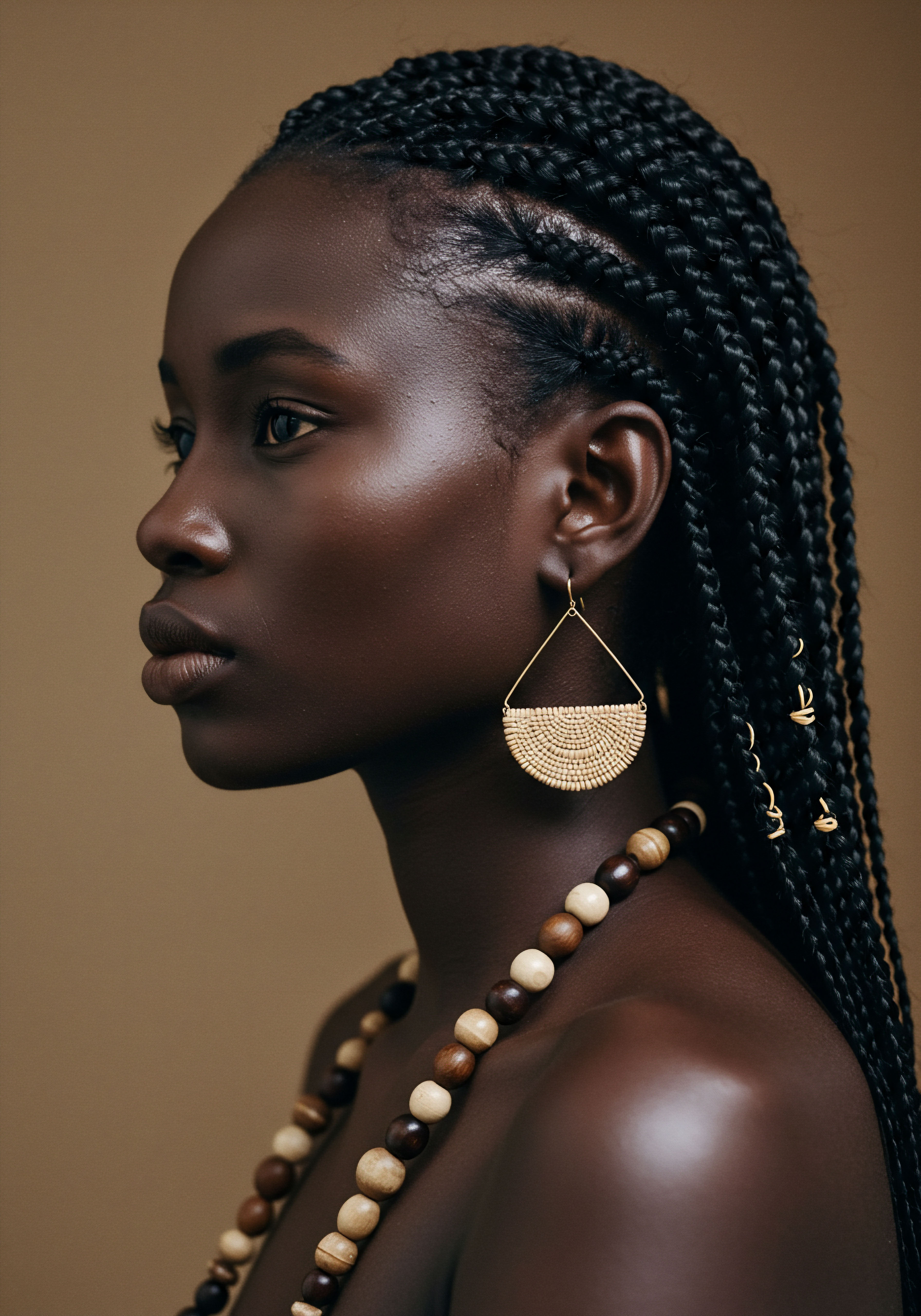
Sleep Disorders and Hair Health Outcomes
The link between sleep and hair health becomes even more pronounced when considering diagnosed sleep disorders. Conditions such as Insomnia and Obstructive Sleep Apnea (OSA) are not just about feeling tired; they represent chronic physiological stressors that can have direct consequences for hair.
For instance, a study published in 2022 highlighted that individuals with sleep disorders faced a higher risk of developing alopecia areata. This suggests a correlation between chronic sleep disturbances and autoimmune conditions that attack hair follicles. Furthermore, research on obstructive sleep apnea has shown a correlation with increased risk for male androgenetic alopecia, particularly when combined with a family history of hair loss. While direct causation remains an area of ongoing study, the evidence points to sleep disorders as significant contributing factors to hair thinning and loss.
Beyond direct physiological mechanisms, the psychological burden of chronic sleep deprivation can also play a part. The stress, anxiety, and depression often associated with poor sleep can themselves trigger hair loss conditions like telogen effluvium. This creates a complex feedback loop where sleep issues contribute to stress, which then contributes to hair loss, potentially exacerbating the sleep problems.
The intricate dance between sleep, hormones, and cellular health underscores the body’s delicate balance, with hair growth serving as a visible indicator of this equilibrium.
This layered understanding compels us to view sleep not as a luxury, but as a foundational pillar of health, with profound implications for the life and appearance of our hair. The connection between sleep and hair is a compelling example of how internal well-being manifests externally, reminding us that true radiance begins from within, nurtured in the quiet hours of restorative rest.
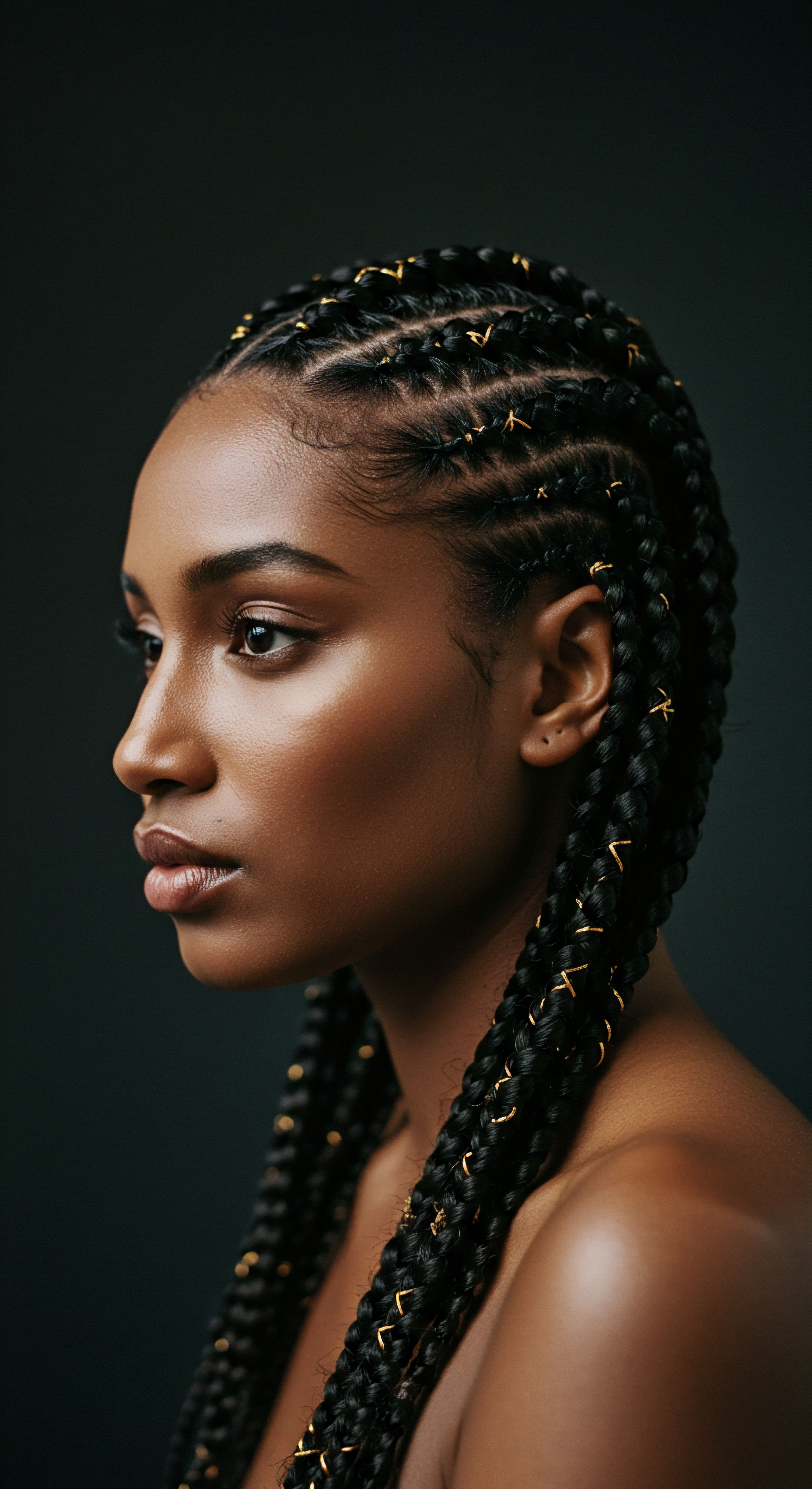
Reflection
As we close our exploration of sleep’s quiet yet profound influence on hair, we are left with a deeper appreciation for the body’s inherent wisdom. The journey from the hair follicle’s rhythmic dance to the cascading effects of a restless night reveals a connection more intricate than many might first suppose. It serves as a gentle reminder that our outward appearance, particularly the vibrancy of our hair, often mirrors the unseen currents of our internal state.
To care for our strands, then, becomes an invitation to care for ourselves in the most fundamental ways, honoring the need for rest that is as ancient as life itself. The delicate balance required for flourishing hair asks for a mindful approach to our daily and nightly existence, recognizing that true beauty stems from a well-rested, well-tended inner landscape.

References
- Treatment Rooms London. (2024, March 2). Can A Lack of Sleep Cause Hair Loss? Retrieved from https://www.treatmentrooms.london/blog/can-a-lack-of-sleep-cause-hair-loss/
- HairFree & HairGrow. (2023, October 27). Sleep and Hair Loss. Relationship Explained. Retrieved from https://www.hairfreehairgrow.com/sleep-and-hair-loss-relationship-explained/
- HHC Clinics. Sleep and Hair Growth – What’s the Connection? Retrieved from https://hhcclinics.co.uk/sleep-and-hair-growth-whats-the-connection/
- Clinikally. (2024, July 16). Impact of Sleep Deprivation on Hair Health. Retrieved from https://www.clinikally.com/blogs/articles/impact-of-sleep-deprivation-on-hair-health
- Good Health by Hims. (2024, November 24). Does Lack of Sleep Cause Hair Loss? Retrieved from https://www.forhims.com/blog/does-lack-of-sleep-cause-hair-loss
- Hair Doctors. (2025, April 2). Can Lack of Sleep Make You Lose Hair? Uncovering the Connection. Retrieved from https://hairdoctors.com.au/blog/can-lack-of-sleep-cause-hair-loss/
- Centre Clauderer. Hair and sleep ❉ the importance of the night for hair health. Retrieved from https://www.centre-clauderer.com/en/blog/hair-and-sleep-the-importance-of-the-night-for-hair-health/
- The Hairy Pill. (2024, October 2). Does Lack of Sleep Cause Hair Loss? The Science Explained. Retrieved from https://thehairypill.com/blog/sleep-and-hair-loss/
- Capilclinic USA Blog. Does Sleep Apnea Cause Alopecia? Retrieved from https://www.capilclinic.us/blog/does-sleep-apnea-cause-alopecia/
- MONPURE. (2024, March 15). Hair Loss ❉ Is Lack of Sleep Stunting Growth? Retrieved from https://monpure.com/blogs/the-science/sleep-and-hair-loss
- Mad Viking. (2024, May 21). How Sleep Deprivation Can Affect Your Hair Health. Retrieved from https://madvikingbeard.com/blogs/news/how-sleep-deprivation-can-affect-your-hair-health
- DiStefano Hair Restoration Center. (2025, March 7). Does Sleep Affect Hair Health? Retrieved from https://www.hairtransplantnetwork.com/blog/Does-Sleep-Affect-Hair-Health/1585
- Harley Street Hair Clinic. (2024, April 14). Does Lack of Sleep Cause Hair Loss? Retrieved from https://www.harleystreethairclinic.co.uk/can-lack-of-sleep-cause-hair-loss/
- Corti Hormonal Research. (2023, March 1). Melatonin ❉ A Game-Changer for Hair Growth and Health – In-Depth Analysis. Retrieved from https://corti.health/blogs/research/melatonin-a-game-changer-for-hair-growth-and-health-in-depth-analysis
- Birmingham Dermatology Clinic. Melatonin stopping hair loss? Retrieved from https://www.birminghamdermatologyclinic.co.uk/blog/melatonin-stopping-hair-loss/
- Carmesi. (2022, June 2). Sleep and Hair Growth ❉ Is There a Connection? Retrieved from https://carmesi.in/blogs/womens-health/sleep-and-hair-growth
- MONPURE. (2024, March 15). Hair Loss ❉ Is Lack of Sleep Stunting Growth? Retrieved from https://monpure.com/blogs/the-science/sleep-and-hair-loss
- La Bonne Brosse. (2025, April 25). Lack of Sleep ❉ What Impact on Hair Health? Retrieved from https://labonnebrosse.com/blogs/news/lack-of-sleep-what-impact-on-hair-health
- DermiMatch Hair Clinic | Scalp Micropigmentation Phoenix, Arizona. (2024, February 11). Lack of Sleep and Hair Loss ❉ Exploring the Evidence. Retrieved from https://dermimatch.com/lack-of-sleep-and-hair-loss/
- Corti Hormonal Research. (2023, March 1). Melatonin ❉ A Game-Changer for Hair Growth and Health – In-Depth Analysis. Retrieved from https://corti.health/blogs/research/melatonin-a-game-changer-for-hair-growth-and-health-in-depth-analysis
- It Really Works Vitamins. Lack of Sleep and Hair Loss. Retrieved from https://itreallyworksvitamins.com/blogs/hair-blog/lack-of-sleep-and-hair-loss
- Typology. (2024, March 6). The consequences of a lack of sleep on your hair. Retrieved from https://www.typology.com/blogs/magazine/lack-of-sleep-hair
- Healthline. (2024, August 5). Melatonin for Hair Loss & Growth, Here’s Everything You Need to Know. Retrieved from https://www.healthline.com/health/melatonin-for-hair-loss
- MONPURE. (2024, March 15). Hair Loss ❉ Is Lack of Sleep Stunting Growth? Retrieved from https://monpure.com/blogs/the-science/sleep-and-hair-loss
- Sleep Centers of Middle Tennessee. (2021, November 18). Can Sleep Apnea Cause Hair Loss? Retrieved from https://sleepcentersoftn.com/blog/sleep-apnea-and-hair-loss/
- Seyyed Ashrafi, S. S. Najafian, M. Ziai, N. Zargari, O. & Narouie, M. (2022). Sleep disturbance in alopecia areata ❉ A cross‐sectional study. Journal of Cosmetic Dermatology, 21(4), 1735-1740.
- Pantene India. Does Lack Of Sleep Cause Hair Loss in Women? Retrieved from https://www.pantene.in/en-in/hair-fall-solution/does-lack-of-sleep-cause-hair-loss/
- Chang, Y. C. Chang, Y. Y. & Chen, H. L. (2014). Obstructive sleep apnea, low transferrin saturation levels, and male‐pattern baldness. Sleep and Breathing, 18, 597-603.
- HCPLive. (2025, April 23). Hair, Scalp Health Linked to Perceived Stress and Sleep Quality. Retrieved from https://www.hcplive.com/view/hair-scalp-health-linked-to-perceived-stress-and-sleep-quality
- Ho, C. H. & Chan, S. (2023). Integrative and Mechanistic Approach to the Hair Growth Cycle and Hair Loss. Journal of Clinical Medicine, 12(1), 300.
- Ho, C. H. & Chan, S. (2023). Integrative and Mechanistic Approach to the Hair Growth Cycle and Hair Loss. Journal of Clinical Medicine, 12(1), 300.